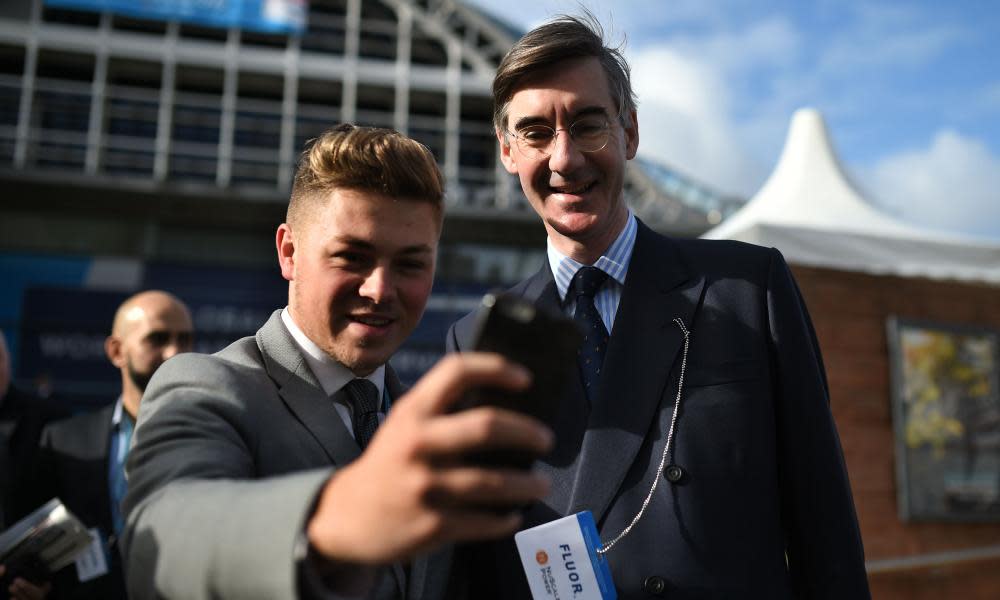The real Tory civil war? It’s about way more than Brexit

It is a snowy December day in New York. Tom Hagen, consigliere to one of the city’s mafia bosses, is stopped on the street by Virgil Sollozzo, a big-time drug-runner, who invites him to get in a car. Fearing a hit, Hagen hesitates. “What are you worried about?” says Sollozzo. “If I wanted to kill you, you’d be dead already.”
I don’t know if Theresa May is a fan of The Godfather, but even if she isn’t familiar with the film, she should recognise that scene. She has been in it enough times. The prime minister has often looked like a hostage in the back of a car driven by backbench Tory MPs. They surround her as she is going about her Brexit business and make her offers she can’t refuse.
Or can she? No one doubts that the Eurosceptic right can hurt May. There are about 60 members of the European Research Group, the faction chaired by Jacob-Rees Mogg. That is more than enough to force a leadership contest. But, despite constant whining about Brexit betrayals, they haven’t pulled the trigger. The Tories are not famously merciful with leaders who disappoint, so it follows that the Moggy Mafia think May is someone with whom they can do business. They like having her in Downing Street. Call it the Sollozzo rule: if they wanted to do her in, she would be done already. That doesn’t make her safe for ever, but it shows the threats so far have been empty.
It is hard to measure the balance of power between the Tory leader and the Brexit hardliners, partly because the nature of their disagreement is confused. Both say the UK must quit the single market and customs union. Both make an inviolable principle of “taking back control”. But May sees that promise through the lens of immigration, while many Tory MPs care more about autonomy in trade. The prime minister always includes the phrase “global Britain” in her speeches, in deference to those Brexiters who see the whole enterprise in terms of a buccaneer nation, casting off the ropes of continental regulation, setting sail on the seven seas of international commerce.
May doesn’t reject that concept, but her instincts are more parochial. She believes the referendum result expressed an epidemic of economic insecurity and cultural dislocation – a howl of rage against a system felt by many to reward arrogant financial elites at the expense of ordinary folk. That is why she is relaxed about aligning Britain with EU regulations on labour protection and environmental standards; she has no urge to light bonfires of red tape. But for many in her party, divergence from EU standards is a national liberation struggle. It is the reason they are Eurosceptic in the first place. May worries about people who voted leave because they wanted respite from globalisation. A bunch of her MPs voted leave because they think Britain isn’t globalised enough.
That difference expresses a profound dilemma for conservatism. It is an argument about the relationship between economic liberalism and social cohesion that has been brewing since the Tories were expelled from power in 1997. It contains a dispute over Margaret Thatcher’s legacy, made more acute by the financial crisis and its ongoing social repercussions.
It leads to questions of whether public discontent today is better explained by excessive exposure to market forces (individual greed driving rampant inequality), or misapplication of market forces (prosperity obstructed by a meddling state). Or where the truth lies between those propositions. Different diagnoses on that spectrum lead to very different policy prescriptions. Yet the Tories have conspired to squeeze this massive ideological conundrum into the tiniest argument over a system for customs checks in Northern Ireland that might be applied some time after 2021.
Some Conservatives are pondering the party’s agenda beyond Brexit. A new thinktank, Onward, was launched yesterday, founded by Tory MP Neil O’Brien, previously an adviser to George Osborne, and Will Tanner, formerly May’s deputy head of policy. It is supported by Michael Gove, environment secretary, and Ruth Davidson, leader of the Scottish Tories, who stood in opposite camps for the referendum campaign.
But before Gove was a leave evangelist he was a pioneer of David Cameron’s modernisation project. It is revealing as a judgment of the way the Westminster wind is blowing that he has chosen now to emphasise that section of his CV. The aim is to develop ideas that will attract younger, socially liberal voters who currently recoil from the Tories. The party’s poll share is propped up by ex-Ukippers and pensioners.
No one seems able to say how the imbalance will be redressed, but identifying the problem is a start. It is also a point of difference with the monomaniac strain of Brexit-Toryism that seems to have lost interest in public opinion since the referendum, as if democracy peaked on 23 June 2016 and nothing voters might subsequently say could count as much – at least not before the job of leaving the EU is complete.
May isn’t that kind of Eurosceptic, but nor does she have the strength to face the zealots down. And neither side can express what the disagreement is really about. Do they even know any more? Many Tories take it for granted that Europe is the cause of division in their party, so a fresh start must be available on other side of the Brexit rainbow. But maybe the opposite is true. Europe isn’t the great Conservative schism any more – it has become the thing that distracts them from their other problems. That is why May is still their leader.
She is the no man’s land candidate, standing between factions and representing none, deferring the civil war. It will be fought one day. Maybe then the Tories will work out what it is they are actually fighting over.
• Rafael Behr is a Guardian columnist

 Yahoo News
Yahoo News 
